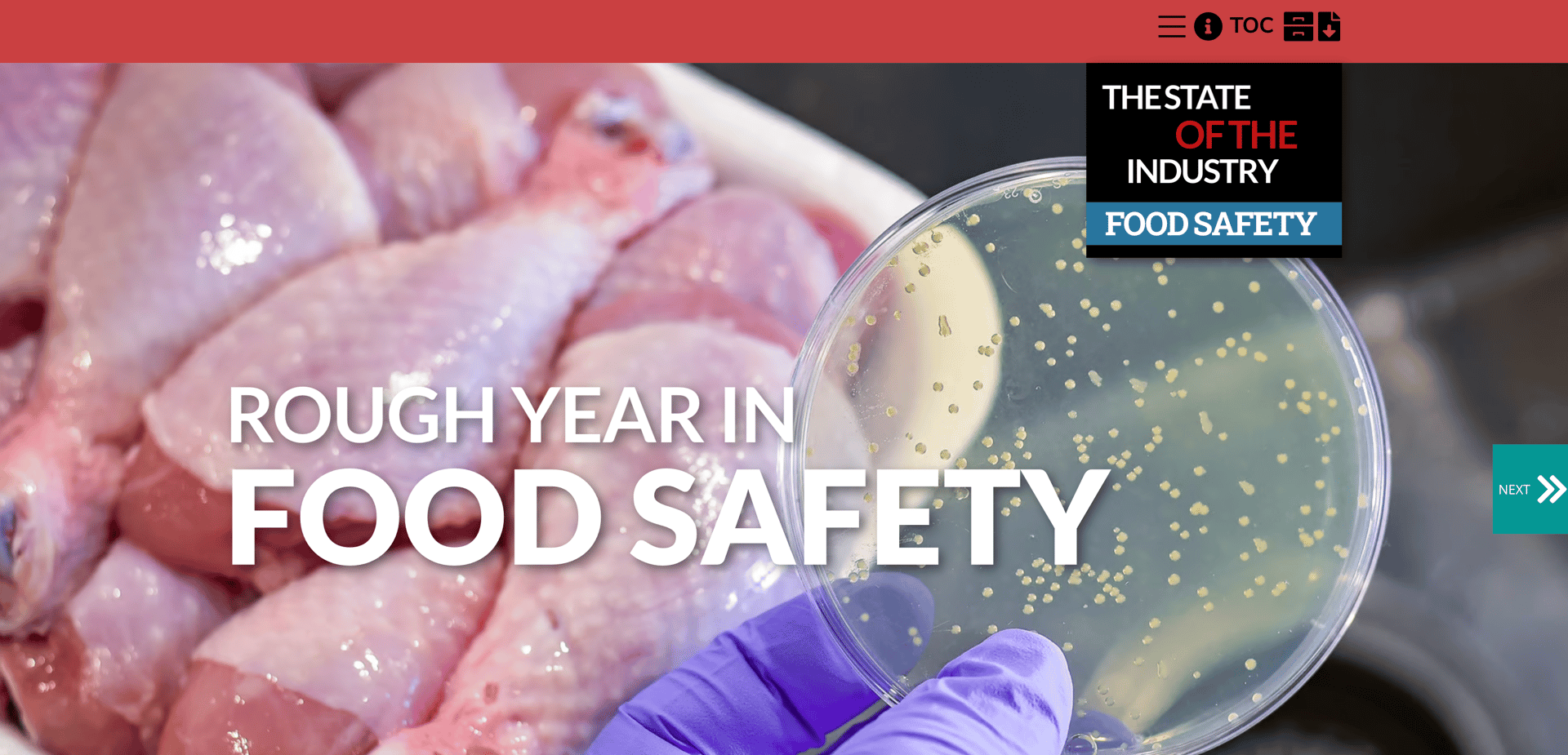2021 deli
Sausage Report
2024
Seaboard Foods
2024 Processor of the Year
cover story: 2024 MIHOF
Animal health and consumer education
top industry agenda
the state
of the
industry
turkey
Turkey industry partners work with USDA and Congress to safeguard the industry.
Despite a whirlwind of challenges and uncertainty caused by pressing animal health issues, the U.S. turkey industry is thriving with dynamic activity. Throughout 2024, the National Turkey Federation (NTF) and its members have been advocating for animal health solutions at the federal level, educating consumers on the benefits of including turkey in their diets year-round and promoting turkey products both domestically and abroad.
NTF on Capitol Hill: Farm Bill and beyond
The upcoming Farm Bill is top of mind for the agriculture sector. NTF has facilitated several virtual and in-person meetings with federal lawmakers to ensure Congress remains apprised and committed to including NTF’s legislative priorities related to animal disease prevention, programs to expand international markets, food safety and more in the final bill.
While progress is being made on the Farm Bill, this process requires significant time and careful consideration. In the meantime, NTF and our members are dedicated to positioning the industry to effectively address animal health challenges and other issues essential to advancing the industry. Ongoing turkey health challenges, such as avian metapneumovirus (aMPV) and highly pathogenic avian influenza (HPAI), were priority topics for discussion at the NTF Leadership Conference in mid-September, which is the industry’s grassroots lobbying event dedicated to growing the industry’s visibility on Capitol Hill. We look forward to continued collaboration with industry partners, USDA and Congress to shape policies that will safeguard the industry for years to come.

National Turkey Federation
By Leslee Oden
Highly Pathogenic Avian Influenza (HPAI)
This year, the U.S. Department of Agriculture’s (USDA) Animal and Plant Health Inspection Service (APHIS) has confirmed the loss of over 1 million turkeys due to the unprecedented HPAI outbreak. In total, more than 14 million turkeys have been lost since the outbreak began in February 2022. While there has been a recent decrease in detections for commercial poultry operations in the U.S., HPAI H5N1 affecting U.S. poultry, domestic livestock and humans has added an extra layer of complexity to addressing the evolving situation. In response, NTF is urging USDA to establish a HPAI Strategic Initiative that engages the brightest minds within industry, universities and government to expand our knowledge and develop novel methods to prevent, detect and respond to avian influenza. Through the initiative, USDA would allocate funds and oversee a program of research projects that address the outstanding questions related to HPAI prevention, detection and response. It is crucial that additional research and mitigation tools are developed to help the turkey industry recover from these significant losses and prevent further outbreaks in commercial operations.
NTF along with the National Chicken Council, United Egg Producers, USA Poultry & Egg Export Council (USAPEEC) and the U.S. Poultry & Egg Association (USPOULTRY) initially sent a letter to USDA in mid-July urging the agency to consider establishing the initiative. Since then, NTF has garnered support from several federal lawmakers urging USDA to establish a HPAI Strategic Initiative. NTF is appreciative of the support and stands ready to work collaboratively with USDA, Congress and other agriculture associations affected by HPAI to further outline and prioritize the research objectives needed to answer the complex questions associated with the disease.
Avian Metapneumovirus (aMPV)
Avian metapneumovirus (aMPV) continues to be a growing threat to the American turkey industry. The respiratory disease has been detected in every poultry producing state in the U.S., including in a large amount of turkey operations, and is the probable cause of low U.S. inventories of turkey eggs in incubators. NTF estimates that the virus is present in 60 to 80 percent of U.S. turkey flocks, with over 1,500 detections since February 2024. However, USDA does not officially track aMPV cases, which complicates data collection. To help protect U.S. commercial turkey flocks and mitigate the impacts of the disease, NTF is advocating for USDA to approve the import of commercial modified-live aMPV vaccines to protect turkeys now while pursuing a long-term strategy for developing a domestic, commercial vaccine. Currently, regulatory approval for a commercial aMPV vaccine domestically does not exist, however outside the U.S., both live and inactivated vaccines are commonly used to immunize both turkeys and chickens against the virus.
In early September, nearly a dozen U.S. Senators led by Sens. Amy Klobuchar (D-MN) and John Boozman (R-AR) penned a letter to USDA urging the agency to approve the import of these vaccines to protect commercial poultry flocks from aMPV. NTF has engaged with USDA’s Center for Veterinary Biologics (CVB) since the beginning of the aMPV situation and hopes action will be taken soon by the agency to provide turkey growers, veterinarians and animal health officials with the tools to curb the spread of the disease and prevent additional poultry losses. NTF looks forward to further collaboration with Congress and USDA officials to develop a strategy that ensures the deployment of all available treatments for this disease, as risks to turkey health and the future of turkey production continue to grow.
FSIS’ Salmonella framework proposed rule
Since the release of USDA’s Food Safety Inspection Service’s (FSIS) Proposed Regulatory Framework to Reduce Salmonella Illnesses Attributable to Poultry in 2022, NTF and its members have actively contributed industry data to the FSIS Salmonella Risk Assessment and maintained an ongoing dialogue with the agency to identify effective, practical solutions that build on the turkey industry’s ongoing efforts to combat Salmonella throughout turkey production. Regarding the Salmonella Framework, while NTF believes that FSIS already possesses the authority and regulatory tools necessary to drive improvements in food safety without implementing a final product standard for Salmonella in turkey products, we are diligently reviewing the proposal so we can provide meaningful comment. NTF believes any standard should be science-based and should not impose unnecessary costs and product destruction for members of the U.S. turkey industry. As we delve deeper into the Salmonella Framework, NTF is committed to continuing our engagement with FSIS to develop comprehensive strategies that will advance this crucial priority while reflecting the concerns of NTF members expressed throughout this policy progression.
Holiday season
As we enter the holiday season and round out the year, we're excited to see turkey take center stage on tables nationwide, along with other cuts of turkey meat and products featured in holiday spreads. NTF has been focused on boosting demand for turkey products by leveraging social media to deliver recipes and creative meal ideas directly to consumers in addition to amplifying turkey’s place in barbecue through Turkey Smoke, a marketing program dedicated to growing turkey’s presence on the grill and smoker. NTF and its members will continue to actively engage consumers, promoting turkey as a versatile choice for any meal, from morning to night.
Additionally, NTF anticipates another successful National Thanksgiving Turkey Presentation will take place at the White House this year where two turkeys from the 2024 presidential flock, being raised by NTF Chairman John Zimmerman and his family in Minnesota, will receive a pardoning from the president of the United States. This cherished event signals the beginning of the holiday season and highlights the crucial role of the U.S. turkey industry in American agriculture. Stay tuned for more details on this beloved annual tradition.
NTF is thankful for the hard work and dedication of everyone involved in the production, processing and delivery of turkey products – especially over the past few years as we’ve faced HPAI head-on. The turkey industry remains resilient, and we look toward 2025 with a strong determination to persevere.
Leslee Oden is NTF’s president and CEO.
All image credits: NTF

